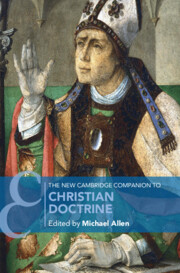Book contents
- The New Cambridge Companion to Christian Doctrine
- Cambridge Companions to Religion
- The New Cambridge Companion to Christian Doctrine
- Copyright page
- Contents
- Contributors
- Preface
- Part I Doctrines
- 1 The Triune God
- 2 Creation and Providence
- 3 Humanity
- 4 Israel
- 5 Christ
- 6 Atonement and Sin
- 7 Holy Spirit
- 8 Holy Scripture
- 9 Church and Sacraments
- 10 Eschatology
- Part II Movements
- Index
- Cambridge Companions to Religion (continued from page iii)
- References
7 - Holy Spirit
from Part I - Doctrines
Published online by Cambridge University Press: 03 November 2022
- The New Cambridge Companion to Christian Doctrine
- Cambridge Companions to Religion
- The New Cambridge Companion to Christian Doctrine
- Copyright page
- Contents
- Contributors
- Preface
- Part I Doctrines
- 1 The Triune God
- 2 Creation and Providence
- 3 Humanity
- 4 Israel
- 5 Christ
- 6 Atonement and Sin
- 7 Holy Spirit
- 8 Holy Scripture
- 9 Church and Sacraments
- 10 Eschatology
- Part II Movements
- Index
- Cambridge Companions to Religion (continued from page iii)
- References
Summary
The person and work of the Holy Spirit are central to visions of the Christian doctrine of God, the Christian gospel, and the Christian life. This judgment is not simply based on a single biblical episode (such as the Pentecost narrative in Acts 2 or the Farewell Discourses of the Gospel of John). Rather, the centrality of the Spirit is grounded in the very logic of how the God of Christian confession, YHWH-Trinity, acts in the world and how this One goes on to be known and worshipped by followers of the Risen One. Christian initiation, the availability of grace, the remembrance of Jesus, the transformation of the heart, the eucharistic life of the church, the reading of Scripture, growth in holiness, the embodied mission of the people of God with “power” and “authority,” the sustained hope of living a cruciform existence in the eschatological “last days” – in short, every feature of God’s self-manifestation and work in the economy of salvation history is not just pneumatologically related but pneumatologically constituted and driven. Gordon Fee captures this sentiment well when he remarks of Paul’s pneumatology: “‘salvation in Christ’ not only begins by the Spirit, it is the ongoing work of the Spirit in every area and avenue of the Christian life.”1 The disciples of Jesus, then, are those called to be a people of the Spirit, ones who walk according to the Spirit and those who bear the gifts and fruit of the Spirit. As Kallistos Ware has so compellingly suggested, “The whole aim of the Christian life is to be a Spirit-bearer, to live in the Spirit of God, to breathe the Spirit of God.”2
- Type
- Chapter
- Information
- The New Cambridge Companion to Christian Doctrine , pp. 103 - 118Publisher: Cambridge University PressPrint publication year: 2022

